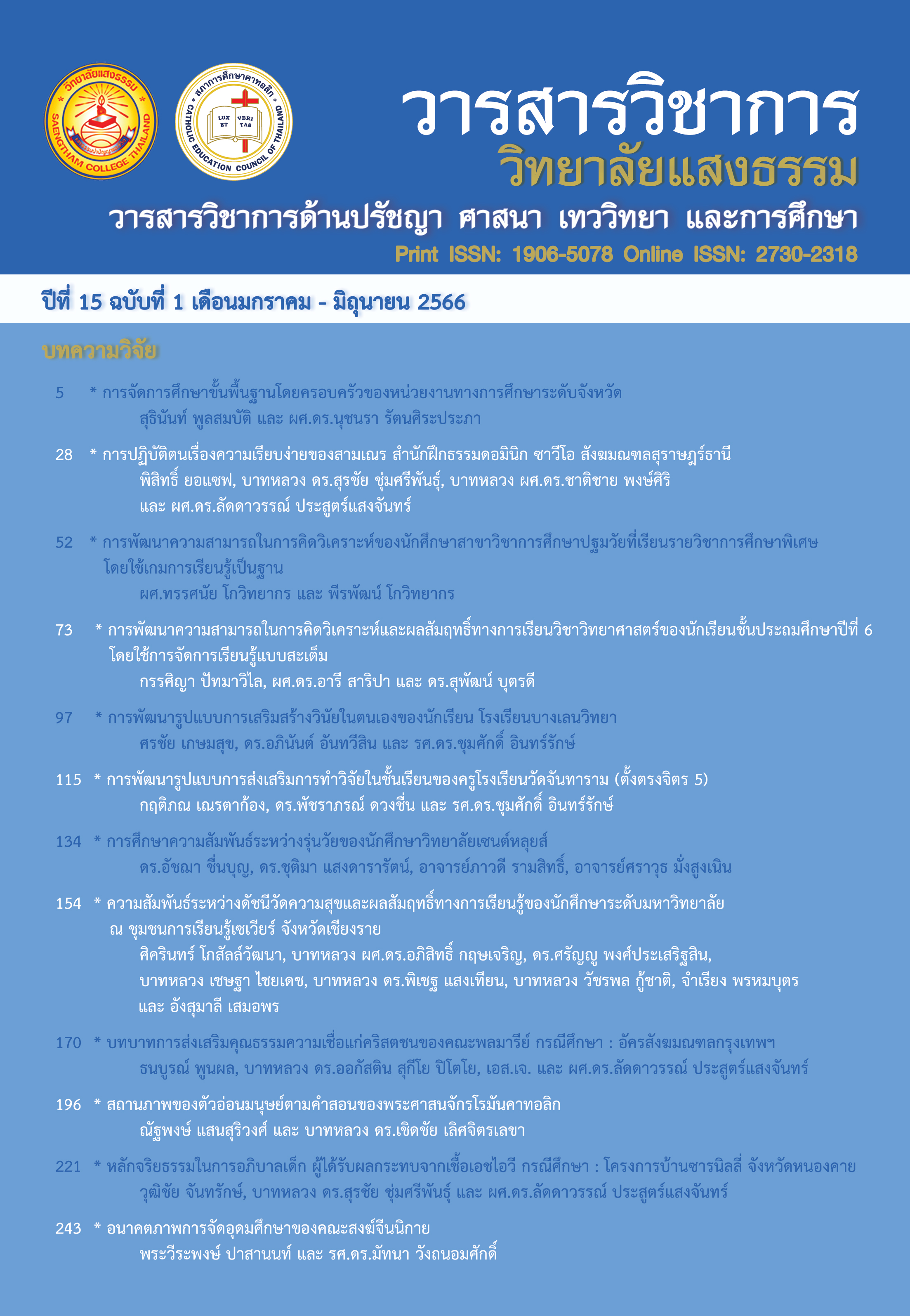Basic Education Administration Of Home School In Provincial Educational Agency.
Main Article Content
Abstract
The purposes of this research were to 1) determine the basic education of home school in provincial educational agency 2) the confirmation of the basic education of home school in provincial educational agency. The sample were 66 units. The research instruments were the semi-structured interview, the opinionnaire and the confirmatory questionnaire for basic education of home school in provincial educational agency. The statistics used to analize the data were frequency, percentage, arithmetic mean, standard deviation, exploratory factor analysis, confirmatory factor analysis, and content analysis.
The research findings were as follows :
1. There were 8 factors for basic education of home school in provincial educational agency; (1) Learning Organization, (2) Assignment of responsibility, (3) Direction, (4) Participation Support, (5) Network, (6) Learning Support, (7) Supervision and Monitoring, and (8) Public Relations.
The basic education of home school in provincial educational agency were verified with accuracy, propriety, feasibility, and utility.
Article Details

This work is licensed under a Creative Commons Attribution-NonCommercial-NoDerivatives 4.0 International License.
- The academic and research articles, as well as the content and opinions expressed therein, published in Saengtham College Journal are solely the responsibility of the respective author(s).
- Articles published in Saengtham College Journal are the property of Saengtham College. Reproduction, modification, or dissemination of all or part of the content in any form without written permission from Saengtham College is prohibited.
- Articles published in Saengtham College Journal are protected under the Copyright Act.
References
จันทนา อุดม. (2560). การพัฒนายุทธศาสตร์องค์กรแห่งการเรียนรู้ มหาวิทยาลัยราชภัฏกลุ่มรัตนโกสินทร์. วารสารวิชาการสถาบันวิทยาการจัดการแห่งแปซิฟิค, 3(2). 204-212.
น้ำผึ้ง มีศีล. (2559). การจัดการศึกษาโดยครอบครัวแบบเสริมสร้างทักษะชีวิตและการทำงานในศตวรรษที่ 21. [ปริญญานิพนธ์ดุษฎีบัณฑิต].
พิชัย เวชยานันท์ และคณะ. (2560). ยุทธศาสตร์การบริหารการจัดการศึกษาขั้นพื้นฐานโดยครอบครัวที่เอื้อต่อการพัฒนาคุณลักษณะอันพึงประสงค์ของผู้เรียนตามหลักปรัชญาของเศรษฐกิจพอเพียง, วารสารบริหารการศึกษา มหาวิทยาลัยขอนแก่น, 2(1). 135-144.
รัชนีย์ ธงชัย. (2557, 6 พฤษภาคม). ซัมเมอร์ฮิลล์' ต้นแบบโฮมสคูลแห่งแรกของประเทศไทย. ไทยรัฐออนไลน์. 6 พ.ค. 2557 https://www.thairath.co.th/content/419307.
วราภรณ์ อนุวรรัตน์. (2554). อุดมการณ์และการจัดการศึกษาโดยครอบครัวในจังหวัดเชียงใหม่. [ปริญญานิพนธ์ดุษฎีบัณฑิต]. มหาวิทยาลัยเชียงใหม่.
วิศิษฐ์ วังวิญญู. (2558). โรงเรียนทำเอง Home-made School. ฟรีมายด์พับลิชชิ่ง จำกัด.
สุภางค์ จันทวานิช. (2557). วิธีการวิจัยเชิงคุณภาพ (พิมพ์ครั้งที่ 22). ด่านสุทธาการพิมพ์.
สุมาลี มีพงษ์. (2559). การเชื่อมโยงการศึกษาโดยครอบครัวกับโรงเรียนและผลสัมฤทธิ์ทางการเรียนของเด็กระดับการศึกษาขั้นพื้นฐาน, วารสารการวิจัยการบริหารการพัฒนา มหาวิทยาลัยราชภัฏสวนสุนันทา, 5(2), 1.
โสวริทธิ์ธร จันทร์แสงศรี. (2559). การถ่ายทอดทางสังคมของกลุ่มบ้านเรียนโฮมสคูล : กรณีศึกษากลุ่มบ้านเรียนแห่งหนึ่งในเขตกรุงเทพมหานคร. วารสารพฤติกรรมศาสตร์เพื่อการพัฒนา มหาวิทยาลัยศรีนครินทรวิโรฒ, 5(2) 1.
สำนักงานคณะกรรมการการศึกษาขั้นพื้นฐาน. (2558). รายงานการวิจัยเรื่องการศึกษาสภาพและความพร้อมการจัดการศึกษาขั้นพื้นฐานโดยครอบครัว. สำนักพัฒนานวัตกรรมการศึกษา.
สำนักงานคณะกรรมการการศึกษาขั้นพื้นฐาน. (2560). การถอดบทเรียนการจัดการศึกษาขั้นพื้นฐานโดยครอบครัว. โรงพิมพ์ชุมชนสหกรณ์การเกษตรแห่งประเทศไทย.
สำนักงานคณะกรรมการการศึกษาขั้นพื้นฐาน. (2562). บ้านเรียน Home School แนวทางการดำเนินงานการจัดการศึกษาทางเลือก. โรงพิมพ์อักษรไทย.
อุรสา พรหมทาและจำเนียร พลหาญ. (2557). การจัดการศึกษาโดยครอบครัว, วารสารวิจัยเพื่อพัฒนาสังคมและชุมชน มหาวิทยาลัยราชภัฎมหาสารคาม, 1(2), 32.
Kaiser quoted in Barbara G.Tabachink, and Linda S.Fidell. (1983). Using Multivariate Statistics. New York Haper & Ro.
Rensis Likert. (1961). The Human Organization. McGraw-Hill.
Robert V. Krejcie and Daryle W. Morgan. (1970). Determining Sample Size for Research Activities, Journal for Education and Psychological Measurement, 3, 608.
Weller. Chris. (2020). Homeschooling is the smartest way to teach kids in the 21st century. https://www.busines-sinsider.com/why-kids-should-get-home-schooled-2016-8.


